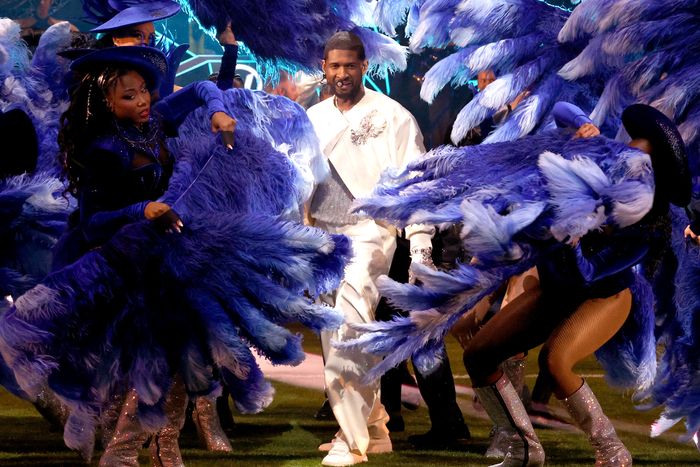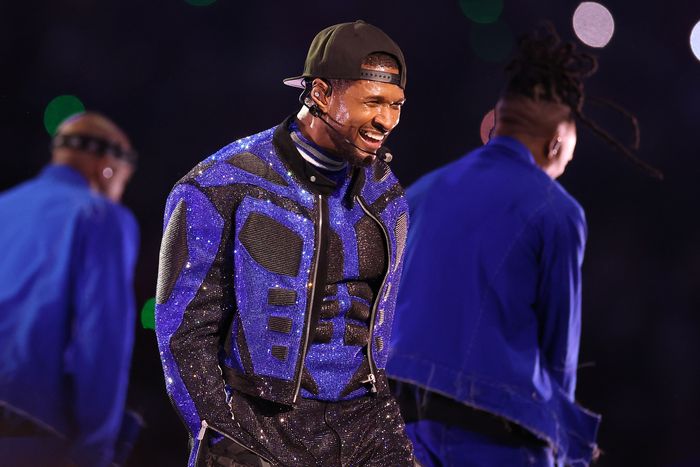
The first time Usher performed at the Super Bowl, in 2011, he dropped out of the sky during a Black Eyed Peas medley, cutting into “Let’s Get It Started” with a taste of “OMG,” the “Hot 100” nuke written and produced by Will.i.am. It was a peculiar moment for the Atlanta R&B veteran. He had journeyed to the top of the singles chart for three consecutive decades, but 2010’s Raymond v Raymond and its 2008 predecessor, Here I Stand, saw only a fraction of the sales enjoyed by 2004’s diamond-certified Confessions. Usher had already fought for every inch of respect he’s earned, at a time when the critical sphere didn’t take R&B seriously enough. But in the 2010s, he tweaked the formula, dropping the patchy Hard II Love and the Zaytoven collab “A” without a Stateside tour. That made his Super Bowl LVIII halftime show on Sunday feel like every bit the post-victory embrace between Taylor Swift and Travis Kelce was: a collision of the endless reevaluation of history afforded by social media, of our shifting attitudes toward celebrities, and of raw, unmitigated drive.
It started and ended with a dash of prime Peach State extravagance: A cocky “Watch this!” between parts of “Confessions” at Usher’s 2020 NPR Tiny Desk show went viral, drawing new fans to a face and voice seemingly unvarnished from nearly 30 years in the biz. He spent the next year playing sold-out shows at his Las Vegas residency, notable for his effortless, inimitable performances and for him serenading celebs like Doja Cat and Keke Palmer in the audience (and for the fit Palmer’s ex pitched about what she wore as she was regaled with “There Goes My Baby”). It all looks like a training montage now, a technician tightening up on form, as he mapped out exercise and dietary routines in the lead-up to the big night.
The halftime performance doesn’t have to be a whirr of powerhouse athleticism, but this year Usher wanted everyone to know he is and always has been R&B’s total package, a goal that was obvious in the battery of promotion before the gig. His accompanying new album, Coming Home, hosts a batch of the “Caught Up” star’s bubbliest songs in years — the stately Afrobeats tune “Ruin,” the giddy Billy Joel flip “A-Town Girl,” the zesty Lionel Richie–type beat in “BIG” — and features both past and present hip-hop and R&B heavyweights: Jermaine Dupri, Pharrell, and Bryan-Michael Cox but also H.E.R., Summer Walker, and Hit-Boy. On one end of the weekend, Usher showcased a rejuvenated songwriting apparatus across a string of regal pure R&B vehicles; on the other, he took us for a spin through his sterling back catalogue.
Amid a slow-boiling Super Bowl peppered with unsettling religious and political ads, Usher descended from a throne emblazoned with his logo to deliver the “singing, dancing, sweating, gyrating, possible relationship issues” a mock red-band trailer advisory before the performance warned about. The set list pulled from three decades. Nineties fans got a little of My Way’s “Nice & Slow.” Diehards from the aughts enjoyed hefty servings of Confessions and a splash of 8701. Defenders of “OMG” in the 2010s saw Will.i.am pop out for a redo. The focus was physicality: tricky footwork on the field and a mic that was clearly turned on the whole time. It was an ostentatious display — a hits revue for the Nextel chirp generation, a quick trip back to the years when the bleating synths in Lil Jon’s “Yeah!” instrumental beckoned drunken paramours to greatness and Skechers squeaked through slow dances soundtracked by “My Boo.” Duetting with Alicia Keys and later holding court with Jon and Ludacris, Usher tapped into the duality that has made his work compelling: He’s the “true playa for real” whose game is admired the world over, except when he wants to broadcast commitment. The prudent artist balances songs about playing the field with guidance for what to do in the event that you make the catch. Sometimes “U Don’t Have to Call,” sometimes “U Got It Bad.”
Cockiness and tenderness are frequent bedfellows in Usher’s catalogue, and they mingled cozily onstage. He seemed to get the same kick out of snuggling with Keys, a married woman, as he did with Palmer. It was the classic Lothario gesture, a flash of devilish attractiveness that fit into the overarching theme of rule-breaking youthfulness, showmanship, and dominance. Machine-gunning us with platinum singles and playing into the strengths of his guests — letting H.E.R. shred, Jon shout, Luda spit, and Keys hit a sour first note (that was shockingly pitch-corrected overnight) — Usher seemed determined never to let us doubt him again. He wanted to share a glimpse of the defiant energy of his longtime home of Atlanta with the world from his new place in Vegas, christening the ground with an A-Town stomp and going all out while singing and dancing on roller skates to restore the reputation of “OMG.”
Outside that, there wasn’t even the slightest whiff of scandal; the 2000s megastar played it just safe enough for right-wing agitators who love grousing about racy content in the big game to desperately pore over footage of Swift’s skybox for material instead. This year’s set was far from sexless; the sense that this kind of sweating and gyrating is appropriate for network television while Rihanna’s, Shakira’s, and J.Lo’s were not is as much a testament to what really grinds pundit gears post-Roe — women doing basically anything liberating — as it is to the time-tested universality of Usher. Given a few minutes of the nation’s collective attention again, the Atlanta legend delivered a simple reminder: R&B still pays the bills.
Correction: An earlier version of this story included the incorrect year of Usher’s Tiny Desk concert.



